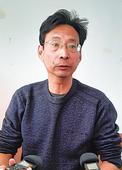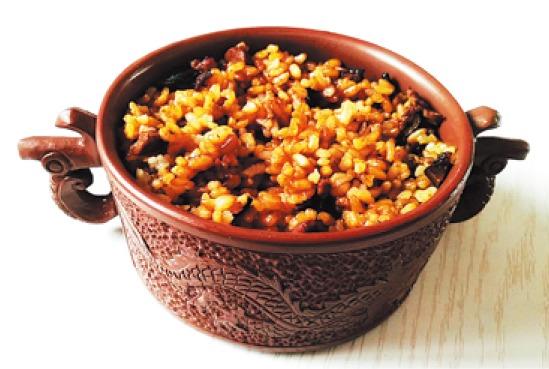 Han Kesheng in his studio at Penguan village in Tianjin. (PHOTO PROVIDED TO CHINA DAILY)
Han Kesheng in his studio at Penguan village in Tianjin. (PHOTO PROVIDED TO CHINA DAILY)
Penguan village has made pottery for 2,000 years. However, it wasn't until Han Kesheng saw its potential that it was turned into a lucrative industry providing employment for hundreds of poor farmers.
The 58-year-old is one of about a dozen inheritors of the intangible cultural heritage of pottery making in the village, which is located in Ninghe district, Tianjin.
The village has farmland of about 2 square kilometers that can generate about 3 million yuan (US$424,790) annually
Since the early 1980s, Han has blazed a trail to promote pottery production and boost villagers' incomes.
Today, income from pottery making equals about half the villagers' farm earnings, Han told Ninghe TV station.
The village has farmland of about 2 square kilometers that can generate about 3 million yuan (US$424,790) annually.
Han said he had taken centuries-old crafts and skills and combined them with new designs.
Villagers employed in his workshops earn combined annual income of about 1.5 million yuan, he said.
"At the peak, one-third of the village population, more than 500 people from different families with histories of pottery making, were working for the company," Han said.
Han and his father decided to revive the ancient pottery-making skills 40 years ago, when they saw that income from farming wasn't enough to support villagers.
Han was the 18th inheritor of the family's pottery-making art in Penguan, which means "village of basins and pots".
"Its name was changed to Penguan about 600 years ago in the Ming Dynasty (1368-1644)," said Han, who believes pottery making in the village dates back 2,000 years.
The village became well known in the Ming and Qing (1644-1911) dynasties, as people in North China traveled to Penguan to learn the art of pottery making.
But in modern times, the inheritors of the intangible cultural heritage, apart from Han and a few others, abandoned pottery making. The market for their handmade goods was shrinking and pottery was mass-produced in factories.
Han refused to give up and turned his family's skill into a business.
 A ceramic work by Han Kesheng. (PHOTO PROVIDED TO CHINA DAILY)
A ceramic work by Han Kesheng. (PHOTO PROVIDED TO CHINA DAILY)
Overseas profits
In 2002, he set up his company, Loujit, which he hoped could capture foreign markets.
To date, Loujit, with the help of US partners, has earned US$20 million exporting handmade pottery to over 90 countries and regions.
"The business climate has declined since last year's trade conflicts initiated by the United States. However, we have never stopped our efforts to sell products," he said.
Han is researching foreign customers' tastes in pottery in a bid to expand international sales.
Last year, Han entered the Red Dot Design Award, a prestigious German competition for the world's best designs.
ALSO READ: Discovering one of the oldest pottery villages in Southeast Asia
"We designed a multifunctional cup with the popular Chinese concept of 'harmony', however, we failed. An insider told us that the concept was not understood by foreigners," he said.
"We were told to make products closer to foreigners' tastes in art, or to have better presentation of the mixed artistic concepts of Chinese and overseas cultures."
Han is partnering with experts from the Tianjin Academy of Fine Arts and the Palace Museum to work out more creative products.
He said his team is hoping for another peak in exports after the novel coronavirus outbreak ends.
Li Kehan, 32, another inheritor of intangible cultural heritage in Penguan, said he had taken the "bumpy road" to promote the village's pottery.
Li is concentrating on online and livestreaming sales of his family's products, which he said are popular with younger generations.
"I'm learning from counterparts in Jingdezhen, Jiangxi province, which is the largest pottery and porcelain production center in China, by making frequent trips and gaining experience," Li said.
READ MORE: Anti-poverty effort pushes ranking up
Ren Shaohui, Party chief of Banqiao county, which administers the village, said the county had invested 5.5 million yuan to boost the pottery industry and tourism sector. Visitors are being offered pottery classes.
"To boost the intangible cultural heritage into more revenue and raise villagers' income is our target, and you see, the two leading inheritors are making their greatest efforts," he said.


